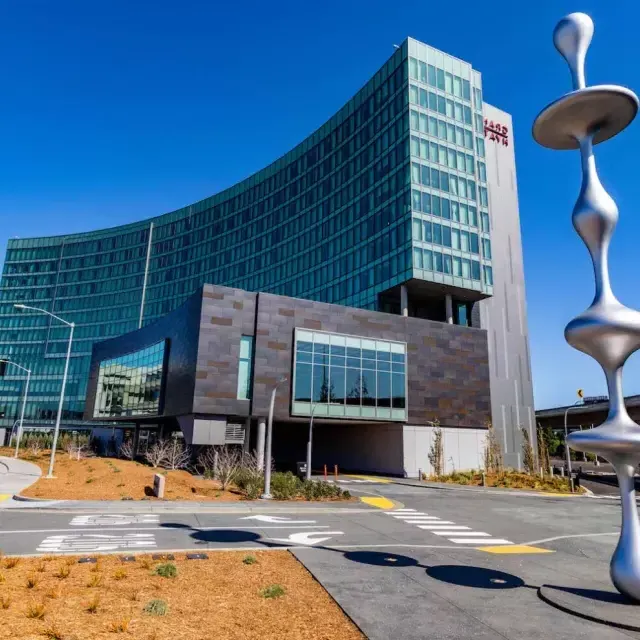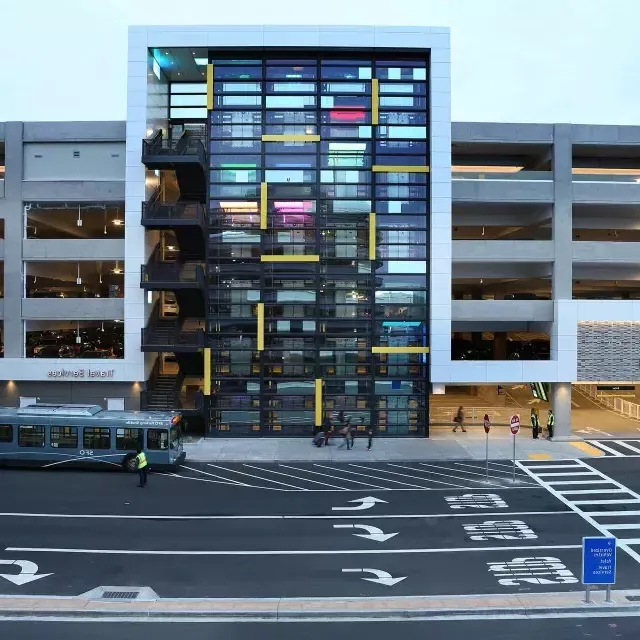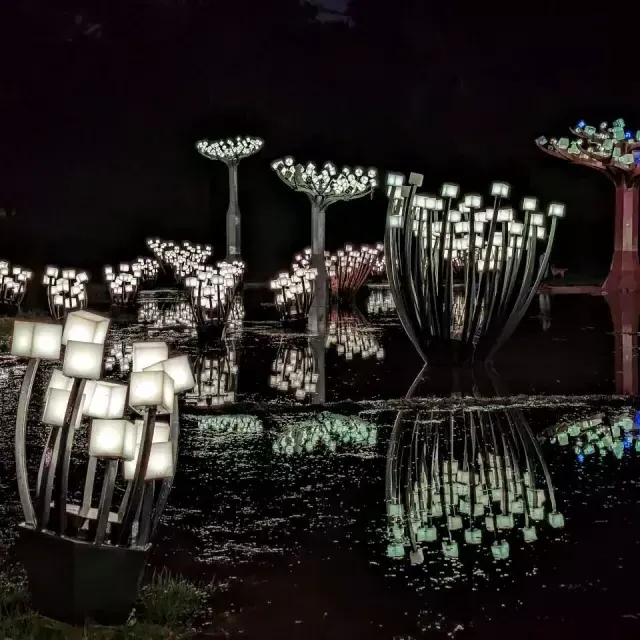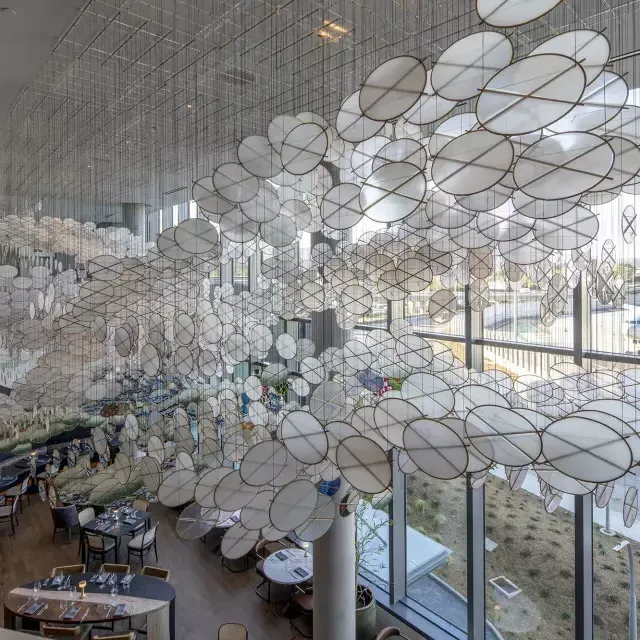
Illuminate SFFeast Your Eyes on Remarkable Light Art at SFO
Among the many things that make San Francisco International Airport so unique is its wide collection of light art.
When you travel through SFO, you can explore an airport-spanning gallery of gorgeous, original art that includes these breathtaking works of light art.
Coding
Johanna Grawunder, 2019
Permanent
SFO Long-Term Parking Garage“Coding” is an immersive installation comprised of light, glass and steel that transforms the parking structure’s elevator tower into a dynamic focal point that can be experienced day or night. Capitalizing on the garage’s inherent architecture, “Coding” incorporates different decorative elements, or "codes," each expressing a quality and experience of the elevator tower. Mirrored square and rectangle windows in the facade, suggesting dots and dashes, spell out "San Francisco" in Morse code. Ignition Yellow steel tags on the structural mullions point north, south, east, and west. Luminous ceilings and undercarriages color-change ever so slowly and become kinetic elements that amplify the up and down movement of elevator rides. The elevator cabins and shafts feature more than 60 strings of specialized lighting by Traxon Technologies that enable an immersive experience through coordinated light shows that change over 24 hours.
Best Viewing: Anytime after dusk.
Wind Portal
Ned Kahn, 2003
Permanent
SFO, between BART Station and AirTrainThe 200,000 mirrored stainless steel disks of “Wind Portal” encircle a 55-foot-wide by 12-foot-deep hole in the main level of the station, through which escalators and stairs run. The myriad of tiny mirrors responds to air currents generated by passing trains and colors reflected from people’s clothing as they pass through the portal, creating an ever-changing mosaic of light, sculpted by the wind.
Best Viewing: The BART station is in SFO's International Terminal, a short walk from United Airlines Terminal 3 (Domestic Terminals 1, 2 & 3 are minutes away on AirTrain).
Orion
Spence Finch, 2020
Permanent
SFO Terminal 1Each star in Spence Finch’s installation is made up of 32 LED lamps. The position of the star sculptures in the installation roughly correlates to their position in the night sky. The distance of each star from the floor is determined by the distance of the star from the Earth. The higher the star, the more lightyears away from Earth it is. “Orion” includes the seven major stars of the constellation Orion, which are Alnilam, Alnitak, Bellatrix, Betelguse, Mintaka, Rigel, and Saiph. The colors of the filters on each lamp represent the spectral emission of that star. For example: Betelgeuse, a very old star, therefore red, has more filters at the red-end of the spectrum, while other stars are much bluer, and have a greater percentage of blue filters.
Best Viewing: SFO Terminal 1 after dark.
Four Sculptural Light Reflectors
James Carpenter, 2000
Permanent
International Terminal, Main Hall Level 3Inspired by the construction of the Wright brothers’ first airplane, “Four Sculptural Light Reflectors” also recalls dirigibles or boats. The artwork is created from translucent, white, silicone-coated fiberglass material stretched over a metal frame and inserted within the truss structure of the skylights, 70 feet above the floor.The 180-by-30-foot sculpture's design is functional in that it diffuses direct sunlight from the skylights, which reflects light up onto the opaque surface of the roof, and projects a dappled play of light into the space.
Best Viewing: In the International Main Hall, look up when walking through the Departures/Ticketing level.
Light Beams for the Sky of a Transfer Corridor
Vitto Acconci, 2000
Permanent
International Terminal, A-G, Level 2“Light Beams for the Sky of a Transfer Corridor” splays out sculptural beams of light from the recessed lighting in the ceiling above, transversing the length of the corridor. At the end of each “light beam” is a functional telephone.
Best Viewing: From the International Terminal Arrival/Baggage Claim, Level 2, follow corridor signs to Terminal 3.
Ceiling Flood
Keith Sonnier, 1999
Permanent
International Terminal, Boarding Area G, Level 2, Post-Security (Restricted Accessibility)“Ceiling Flood” fully integrates with the terminal’s architectural lighting, so that travelers notice evenly spaced boxes of blue neon light on the left matched by evenly spaced boxes of red neon on the right as they move through the space. A line of neutral fluorescent light fixtures punctuates the point of the “V” above, and a strategically placed line of neon tubing provides a subtle yellow glow down the length of the ceiling. To break up the 1000-foot-long space, colors switch half way down the hall, signaling the end of the corridor.
Best Viewing: Post security; accessible to ticketed passengers for Boarding Area G only.
Spirogyrate
Eric Staller, 2014
Permanent
Terminal 3, Boarding Area E, Level 2, Post-Security (Restricted Accessibility)Utilizing light, space, and motion to delight and surprise the public, Eric Staller’s artwork “Spirogyrate” is an immersive and interactive installation composed of graphic spiral patterns and light that change and respond to people’s movement through the space. The result is a whimsical environment to be enjoyed by travelers of all ages.
Best Viewing: Post security; accessible to ticketed passengers for Boarding Area E only.
Sky
Merge Conceptual Design, 2014
Permanent
Terminal 3, Boarding Area E, Level 2, Post-Security (Restricted Accessibility)“Sky” is a collaborative installation by Franka Diehnelt and Claudia Reisenberger that explores perceptions of space. Each mirrored sphere's exterior reflects and distorts its surroundings, as subtle shifts in light and color create an optical effect in the interior of each sphere. This creates the illusion that each space seems to be simultaneously expanding and flattening, causing the viewer to lose sense of the spheres' proportions.
Best Viewing: Post security; accessible to ticketed passengers for Boarding Area E only.















